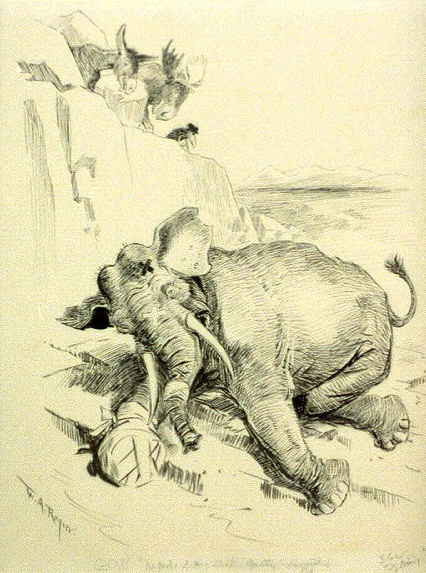By Elvin Lim

G.O.P., reports of my death are greatly exaggerated. W.A. Rogers. Source: Library of Congress.
The Republican party has traditionally been the more conservative party not only in terms of values but also in terms of organization reform. Leaders tend to be slower than their Democratic counterparts in reforming the nomination process, and voters tend to be more deferential to the last cycle’s runner-up to the winner.
What changed in the last few years was an concerted effort to democratize the Republican Party, fueled in part by the success of the Democratic nomination contest between Obama and Clinton in generating an enthusiasm gap in 2008. This included expanding proportional representation in nomination contests, and an unprecedented number of debates to the calendar. The result thus far has been chaos, restrained only in part by the overriding imperative to find a candidate who can unseat Obama. Republicans are relearning their earlier intuition that more voices don’t always lead to a coalescing chorus.
The White House understands this. One wonders if the Obama administration’s blunder about a birth-control insurance mandate on religious institutions was so poorly executed that it may actually have been perfectly timed. On the heels of the Catholic candidate Rick Santorum’s trifecta win, the administration decided to announce a controversial mandate requiring that women in religious institutions be entitled to contraception coverage in their health insurance, only to reverse this decision almost immediately. Either this was spectacularly amateur politics, or a high-risk attempt to put social issues back on the Republican primary agenda on the eve of the CPAC conference to aid Romney’s Catholic rivals. Romney ended up winning the CPAC straw poll and thereby entrenching his conservative credentials, but Santorum ended up a close second.
With barely any media attention devoted to the recent victories for gay marriage in California and Washington, the Obama campaign recognizes that the only reliable issue left for social conservatives to fight on is abortion (immigration being a sensitive topic for both parties), and this is possibly why they took the risk of taking it on. Social conservatives, for their part, were very wise to quickly connect the contraception mandate to the anti-Obamacare animus shared by other conservatives, so that God may remain relevant in an election year that will be mostly dedicated to the economy and debates about big government. This ideological fusion is Santorum’s ticket to unseating Romney — at least this is what the White House hopes — because as long as values matter, the conservative alternative to Romney will.
With no closure in sight, the Republican candidates must trudge on to Michigan and Arizona. It will not be until Super Tuesday, when the big delegates counts are at stake, before Romney’s coronation can be confirmed.
 Elvin Lim is Associate Professor of Government at Wesleyan University and author of The Anti-Intellectual Presidency, which draws on interviews with more than 40 presidential speechwriters to investigate this relentless qualitative decl
Elvin Lim is Associate Professor of Government at Wesleyan University and author of The Anti-Intellectual Presidency, which draws on interviews with more than 40 presidential speechwriters to investigate this relentless qualitative decl
By Elvin Lim
In recent weeks, factions within the Republican party have begun jostling for power within the conservative movement. This is the bitter-sweet inevitability of being more than the party in opposition, but also a party recently co-opted into power. Whether the disagreement is between Rick Santorum versus Sarah Palin, or the Family Research Council versus GOProud , or Tea Party members of Congress and moderate Republicans debating the budget, or William Kristol and Glenn Beck on democracy in Egypt, these differences are only going to grow as we head toward Republican primary season.
There are, of course, differences in priorities within the Democratic fold as well. But the source of the president’s incumbency advantage derives from the fact that these differences will not be played out during the primary season. He will likely enjoy the benefit of not being challenged. So when Republican candidates are invariably jostling for advantage, the president can simply go about his business, looking presidential (and raising money.)
The reason why Ronald Reagan’s historical legacy has been revised upwards in recent times is because the children of his revolution know of no better way to hold themselves together. Or put another way, the celebration of Reagan only reveals the dearth of leadership in the conservative movement, which is still looking to the past because they cannot yet see anyone who can take them to victory in the future.
At this time in the 2008 cycle, Barack Obama had already declared his candidacy, alongside a formidable front-runner, Hillary Clinton.
Today, there is a long, lackluster, and uncommitted list of potential candidates on the Republican side (so much so that even Donald Trump managed to steal the show at this year’s CPAC Conference), but no major candidate has taken the plunge. Why? Because whoever takes the first plunge would become the universal target of all those not yet declared, and will suffer the irony that the first-mover advantage becomes the first-victim-of-infighting disadvantage. The more potential candidates predict infighting, the later they will declare, so that they can stay above the fray for as long as they can. No one candidate feels confident enough to pull the three major strands of conservatism – the libertarians, the social conservatives, and the neo-conservatives – together, and this is why Reagan is still the godfather revered.
Watch the lesser known candidates be among the first to declare as they would be able to secure some national media attention when the Reagan Library hosts the first Republican primary debate for the season on May 2, 2011. The better known candidates have more to lose and less to gain by declaring early.
In particular, s/he who waits until the situation in Egypt as well as the budget battle between the President and Congress unfolds would better be able to pivot toward the emerging priorities of the conservative movement. If Egypt transitions into a democracy friendly to US interests, then neo-conservatives of the Kristol variety would have won the argument
Elvin Lim is Assistant Professor of Government at Wesleyan University and author of The Anti-intellectual Presidency, which draws on interviews with more than 40 presidential speechwriters to investigate this relentless qualitative decline, over the course of 200 years, in our presidents’ ability to communicate with the public. He also blogs at www.elvinlim.com. In the article below he looks at health-care reform. See Lim’s previous OUPblogs here.
After attempting a pivot to jobs, the Obama administration has realized that a hanging cadence on health-care will not do. Perhaps they should never have started it, but closure is what the administration now must have. An encore after the strident audacity of hope on health-care reform was temporarily dashed after the election of Scott Brown to the Senate.
In the immediate aftermath of that election, Democrats were in danger of exchanging over-confidence for excessive humility. After Obama’s historic election the year before and Arlen Specter’s party switch, Democrats were overtaken by hubris that Obama’s tune of change could be used to overturn Washington and to compel it toward a Progressive utopia. But just as Democrats were foolhardy to think that 60 votes in the Senate gave them invincible power, they somehow thought after the Massachusetts Senate election that 59 made them completely impotent.
In the media, we hear, conversely, about the conservative comeback in hyperbolic terms. On Saturday, Glenn Beck, not Sarah Palin or Mitt Romney, delivered the keynote speech in the largest annual conservative gathering, the CPAC conference. If Beck’s stardom exceeds that of the winner of the CPAC straw poll this year, Ron Paul, it is because the conservative movement, charged as it is, remains a movement in search of a leader. It is also a movement, as Beck’s criticism of Progressive Republicans in his speech reveals, which is not exactly in sync with the Republican party – the only machine capable of taking down liberal dreams.
And so a Democratic comeback on health-care reform is afoot. With one vote shy of a fillibuster-proof majority, Senator Harry Reid has opened the door to the Budget Reconciliaton process that more Progressive advocates of health-care reform like Governor Howard Dean have been pushing for a while. While it is not clear that there are 50 votes in the Senate for the public option, assuming that Vice-President Biden will cast the 51st, what is clear is that Democrats are much more likely to push through a liberal bill with the veto pivot sliding to the left by ten Senators.
In the White House too, we see a coordinated move to bring Reconciliation back as an option. Obama used his weekly address on Saturday to lay the ground work when he warned that “in time, we’ll see these skyrocketing health care costs become the single largest driver of our federal deficits.” He said this because in order to use Reconciliation, Democrats must show a relationship between health-care reform and balancing the federal budget.
No one in Washington believes that Thursday’s Health-care Summit will magically generate a consensus when in the past year there has been nothing but partisan bickering. If so, the President is not being naive, but signali
Elvin Lim is Associate Professor of Government at Wesleyan University and author of The Anti-Intellectual Presidency, which draws on interviews with more than 40 presidential speechwriters to investigate this relentless qualitative decl
0 Comments on The Road To Super Tuesday as of 1/1/1900Add a Comment


